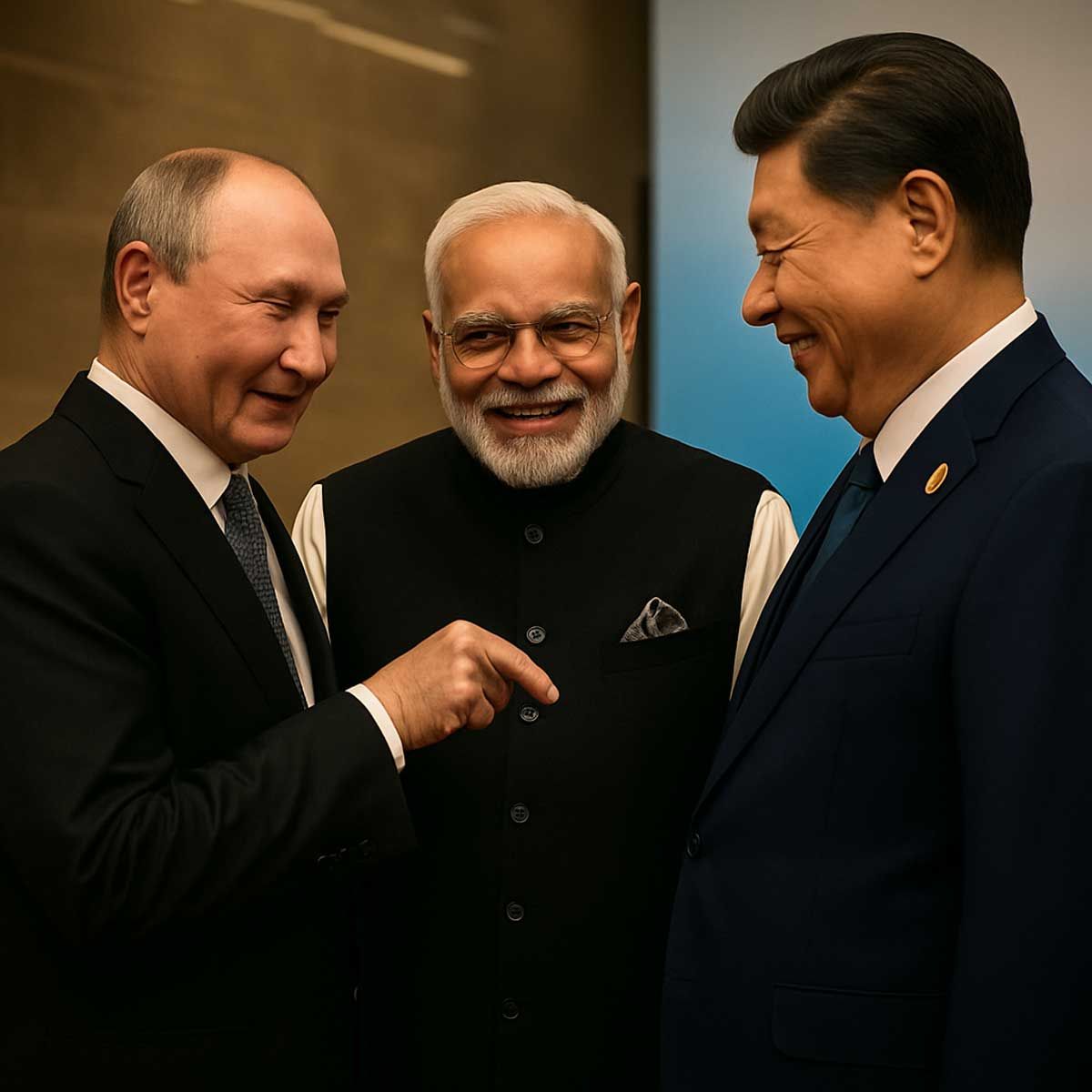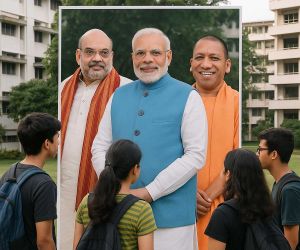MORE COVERAGE
Twitter Coverage
Satyaagrah
Written on
Satyaagrah
Written on
Satyaagrah
Written on
Satyaagrah
Written on
Satyaagrah
Written on
JOIN SATYAAGRAH SOCIAL MEDIA
Peter Navarro’s Brahmin profiteer rant echoed Rahul Gandhi’s caste census script, exposing how US deep state and Congress plot align, turning Modi’s SCO ties with Putin and Xi into a weapon of anti-Brahmin hate while America profits from Ukraine war

It is often said that the more a person talks, the more they reveal their real self. This describes White House Trade Adviser Peter Navarro, who has recently taken to giving back-to-back interviews in an attempt to defend US President Donald Trump’s controversial decision to impose a 50 per cent tariff on India. But instead of limiting his arguments to economics, Navarro has turned to divisive rhetoric. In a striking shift, he accused Brahmins in India of “profiteering at the expense of the Indian people.”
|
Speaking to Fox News on Monday, Navarro lashed out at India’s trade practices and foreign relations. He branded India as “nothing but a laundromat for the Kremlin”, arguing that the country was helping to create trade imbalances and alignments that undermined American interests. While he briefly called Prime Minister Narendra Modi a “great leader”, Navarro immediately criticised Modi’s foreign policy, particularly India’s engagement with Russia and China. He suggested that such alliances weaken India’s democratic credentials.
Navarro tried to link multiple global crises to India’s trade policies. He said, “And on top of that, by the way, 25 per cent or 50 per cent is because India is the Maharaja of tariffs. They have the highest tariffs in the world. They won’t let us sell to them, so who gets hurt, workers in America, taxpayers in America… Ukrainians in cities are getting killed by Russian drones.”
He continued, “So, you know, look, Modi’s a great leader… But I don’t understand why he’s getting into bed with Putin and Xi Jinping…when he’s the leader of the biggest democracy in the world. I would just simply say to the Indian people. Please, understand what’s going on here. You’ve got Brahmins profiteering at the expense of the Indian people. We need that to stop.” By drawing caste into his remarks, Navarro turned India’s domestic divisions into a global talking point.
The comments came right after Prime Minister Modi met Chinese President Xi Jinping on the sidelines of the SCO leaders’ summit. The two leaders spoke about the “positive momentum” and “steady progress” in their relationship since their last meeting in Kazan during the BRICS Summit in October 2024. Against this backdrop, Navarro’s criticism appeared aimed at undermining India’s balancing act in international diplomacy.
Navarro had already taken a harsh line earlier in the week. On Friday, he attacked India’s oil industry, saying, “India’s Big Oil lobby has turned the largest democracy in the world into a massive refining hub and oil money laundromat for the Kremlin. Indian refiners buy cheap Russian oil, process it, and export fuels to Europe, Africa, and Asia – shielded from sanctions under the pretence of neutrality.”
In another interview with Bloomberg, Navarro went further and even described the Russia-Ukraine war as “Modi’s war”. He argued, “Ukraine comes to us and Europe and says give us more money (for its war). Everybody in America loses because of what India is doing. Consumers and businesses lose; workers lose because India’s high tariffs cause jobs, income and higher wages. The taxpayer loses because we got to fund Modi’s war.” He capped his remarks by calling Indians “arrogant.”
Navarro later wrote an opinion piece in the Financial Times titled “India’s oil lobby is funding Putin’s war machine — that has to stop.” In it, he repeated his charges that India’s crude oil purchases were financing Russia’s war. He declared that India must stop “cosying up” to Moscow and Beijing if it wanted to be accepted as a strategic partner of the US. Yet, while lecturing India, Navarro made no mention of what Washington should do to treat India as an equal. Nor did he question Trump’s silence on Pakistan, a country long linked to terrorism, and its military ruler Asim Munir.
|
Navarro Blames India’s ‘Greed’ for Ukraine Deaths While US Profits From the War
Navarro’s most provocative claim was that Ukrainians are dying because India is buying cheap Russian oil for profit. However, as independent reports have shown, it is the United States that has emerged as the biggest profiteer of the Russia-Ukraine conflict.
During a meeting with US President Trump in Alaska on 16 August 2024, Russian President Vladimir Putin revealed that US-Russia bilateral trade had actually grown by more than 20 per cent in the previous months. This revelation contradicted Trump’s constant claims that Washington had been putting pressure on Moscow to end the war.
American energy corporations, particularly oil and gas giants like Chevron and ExxonMobil, have made record profits since the outbreak of the war in 2022. Liquefied natural gas (LNG) exports surged as the US sold gas to Europe at prices often four times higher than domestic rates, citing “war disruptions.” In 2022, American oil and gas companies registered profit jumps of over 125 per cent compared to pre-war 2021 levels.
Beyond energy, the US also benefitted enormously through arms exports. Trump’s administration sold weapons to Ukraine via European nations at an estimated 10 per cent premium, turning conflict into profit. Trump even went so far as to put a dollar value on US security guarantees to Kyiv.
In reality, while Navarro accused India of enabling Russia, the US itself has profited more than any other country from the ongoing bloodshed. Whether through energy sales or arms supplies, Washington has found ways to turn war into business, even while criticising others.
|
Is Navarro Stirring Caste Unrest in India by Targeting Brahmins?
Among Navarro’s remarks, one of the most striking was his attempt to single out Brahmins as the supposed beneficiaries of Russian oil trade. He claimed that “Brahmins are profiteering at the expense of the Indian people.” However, this claim has no factual basis.
In reality, Brahmins do not dominate India’s oil sector or its political leadership. The country’s biggest industrial names—Mukesh Ambani, Gautam Adani—are not Brahmins. India’s top political leaders, including Prime Minister Narendra Modi and Home Minister Amit Shah, also do not belong to the Brahmin community.
Navarro’s words exposed either deep ignorance or a deliberate attempt to echo domestic caste politics for global audiences. Much like Donald Trump’s earlier comments that India and Pakistan had been at war for “hundreds of years,” ignoring the fact that Pakistan was created only in 1947, Navarro’s statement betrayed a lack of understanding of India’s social and political realities.
At the same time, the possibility of deliberate provocation cannot be dismissed. Caste-based rhetoric has been a rallying point for India’s opposition parties, and criticism of Brahmins often earns quick acceptance in left-liberal and anti-Hindu circles. Navarro’s choice of words, therefore, appeared less accidental and more like an effort to stir social unrest.
By targeting a specific community, Navarro risked exporting India’s internal caste politics to the international stage. For many observers, this was not merely about trade or diplomacy—it was about fuelling divisions that could weaken India domestically even as it seeks to play a stronger global role.
|
Brahmin Conspiracy, Russian Oil, Global Chaos? India Moves Ahead While Navarro Rants
“Brahmins Launder Oil, Modi Shakes Hands, Navarro Panics—India Sips Chai and Gets the Job Done. While Navarro turns global diplomacy into a reality TV drama, India quietly manages energy, trade, and strategy like a boss. Discount oil? Strategic autonomy? Multipolar diplomacy? Too boring for the headlines, but perfect for results. Facts optional, finger-pointing mandatory—Navarro style. Meanwhile, the world moves on, whether he likes it or not.”
Peter Navarro’s latest tirade has once again turned global diplomacy into theatre. In a fresh outburst on Fox News, the former White House trade adviser accused India of laundering Russian oil to fund Moscow’s war in Ukraine. He even went further to claim that India’s Brahmin community is profiteering at the expense of the wider population. These accusations, delivered with sweeping generalizations, reveal more about Navarro’s tendency for political grandstanding than about India’s actual policies. His remarks lacked credible evidence and displayed both a poor grasp of international trade dynamics and a disregard for India’s cultural sensitivities.
Navarro’s charge that India is laundering Russian oil is not only exaggerated but also a gross oversimplification of the global energy market. It is true that India has increased its purchases of discounted Russian crude, but this decision has been driven by economic logic rather than political allegiance. As one of the world’s largest importers of oil, India must secure energy at affordable prices to protect its growing economy.
The energy trade is not a simple case of “buying from Russia to help Moscow.” Oil markets are complex, interconnected, and volatile. Countries refine crude and export finished products as a matter of routine. India, like many others, buys oil from multiple sources, refines it, and sells it onwards to different regions. To label this as a form of laundering is misleading. Such rhetoric only inflames tensions, undermining meaningful discussions about global supply and energy stability.
Perhaps the most troubling part of Navarro’s commentary was his attack on India’s Brahmins. By alleging that “Brahmins are profiteering at the expense of the Indian people”, he singled out an entire community without presenting a shred of evidence. This is not just inaccurate—it is culturally insensitive.
India’s oil industry is made up of diverse players, including multinational companies, state-owned enterprises, and private conglomerates. To claim that one social group is monopolising these benefits is both unfair and divisive. Navarro’s statement reinforces harmful stereotypes and risks deepening social fault lines within India. Instead of focusing on the realities of the global energy crisis, he has chosen to turn it into a cultural provocation.
Navarro also criticised Prime Minister Narendra Modi’s outreach to Russian President Vladimir Putin and Chinese President Xi Jinping, suggesting that such moves were destabilizing. But this interpretation ignores the very essence of international diplomacy.
India’s foreign policy has always been about strategic autonomy—maintaining independence in decision-making while engaging with all major powers. In a multipolar world, no nation can afford to isolate itself by choosing only one side. India’s dialogues with Russia and China are not endorsements of their actions but are part of a broader strategy to safeguard national interests, diversify partnerships, and strengthen its global position.
Labeling these efforts as betrayal or alignment with authoritarian regimes oversimplifies reality. Diplomacy requires nuance, and India’s approach reflects that nuance far better than Navarro’s commentary does.
Navarro also defended the Trump administration’s decision to impose a 50 per cent tariff on Indian goods, linking it directly to India’s oil purchases from Russia. This justification exposes the coercive nature of the policy. Tariffs are blunt instruments—they hurt ordinary workers, consumers, and small businesses far more than they impact governments or elites.
By connecting tariffs to global politics, Navarro framed punishment as policy. Instead of fostering cooperation, he argued for economic warfare. Yet, if Washington truly seeks a strong and equal partnership with India, punitive tariffs are the wrong approach. Dialogue, negotiation, and finding shared solutions are the tools of effective diplomacy. Economic coercion only fuels resentment and damages trust.
|
Navarro’s Anti-Brahmin Rant Mirrors Opposition’s Caste Politics in India
Peter Navarro’s attack on India’s Brahmins fits neatly into the opposition’s existing narrative. For years, Congress and its allies have painted a picture where so-called upper castes monopolise resources while “lower castes” are denied their rights. Navarro’s words sounded eerily similar to Congress leader Rahul Gandhi’s repeated slogans about “caste X-ray” and his promise of “Jitni aabadi utna haq”—a direct pledge to not only conduct a caste census but also redistribute wealth on caste lines.
The DMK’s long-standing anti-Brahmin politics in Tamil Nadu is so entrenched that it no longer sparks outrage. Meanwhile, several opposition parties have been demanding expanded reservations for SC, ST, and OBC groups. Against this backdrop, Navarro’s statement that “Brahmins are profiteering at the expense of the Indian people” appears less like ignorance and more like opportunism. He seems to have noticed that anti-Brahmin rhetoric sells in Indian politics—and can be weaponised against Prime Minister Modi’s government.
|
Anti-Brahmin Propaganda Goes Global
Navarro’s comments, seeped in orientalism, are not surprising when placed against the backdrop of caste propaganda already spreading in the United States. In 2023, the California State Senate passed SB-403, a law banning caste discrimination. As reported earlier, groups like Equality Labs have been instrumental in pushing anti-Brahmin narratives in America.
The trend has been visible across US institutions. From Brandeis University in 2019 adding caste to its non-discrimination policy, to the CISCO caste discrimination case, to elite campuses like Harvard University, Brown University, Colby College, and the California State University system following suit, caste has been steadily inserted into American policy debates. The Seattle City Council even passed a resolution to add caste as a protected category, and California’s SB-403 was framed as a progressive step, though critics saw it as a direct attack on Hindus, particularly Brahmins.
Alongside legal changes, seminars, events, and university discussions have consistently portrayed Brahmins as the villains of India’s caste story. DEI (Diversity, Equity, Inclusion) programs in American universities have gone so far as to normalise hatred toward Brahmins. Some critics have even likened this demonisation to the way Nazis incited hatred against Jews.
US Officials Exploiting India’s Caste Divide
It appears even Trump administration officials have been watching these trends closely. Navarro’s sudden use of caste language suggests that the anti-Brahmin narrative being pushed by Congress and opposition parties in India has been noticed in Washington. By adopting it, Navarro has found a convenient tool to pressure the Modi government while pretending to stand for “justice.”
This timing is not accidental. With opposition parties in India desperate to revive caste politics, Navarro’s remarks look like an extension of that strategy—an effort to exploit divisions for geopolitical leverage. His message seemed to suggest that Brahmin dominance was somehow linked to global crises like the Russia-Ukraine war and that Modi was favouring elites. In reality, it read more like a coordinated attempt to give international cover to India’s opposition narrative.
|
Opposition’s Hypocrisy: Rationalising Hate Against Brahmins
The reaction of India’s opposition ecosystem was telling. Instead of condemning Navarro’s comments as racist and casteist, many rushed to rationalise them.
Congress leader Karti Chidambaram defended Navarro, claiming, “Boston Brahmins” is a term used to describe the elite of the society in common parlance.” TMC’s Rajya Sabha MP Sagarika Ghose made a similar attempt to intellectualise Navarro’s attack. Other Congress voices also began contextualising his remarks, framing them as legitimate critique rather than foreign interference in India’s social fabric.
This selective tolerance revealed deep-seated biases. If a foreigner had spoken in such sweeping and insulting terms about any other community, the same leaders would have expressed outrage. Yet, because the target was Brahmins—and because criticising Modi was the larger goal—silence or even approval became the chosen response. The hypocrisy was clear: political hatred mattered more than defending Indians against insult.
Conclusion: A Call for Constructive Engagement
Peter Navarro’s remarks are a stark reminder of how oversimplification and cultural insensitivity can distort international dialogue. It is legitimate to discuss global energy markets, trade tensions, or foreign policy disagreements, but such debates must be rooted in facts and conducted with respect. Targeting communities, promoting stereotypes, or importing divisive narratives does nothing to solve problems.
For India, the lesson is equally important. As Navarro’s comments show, even powerful nations can attempt to exploit domestic divisions for their own advantage. Opposition parties, in their eagerness to attack Modi, risk aligning with such narratives and undermining the dignity of their own people.
The path forward lies in constructive engagement, shared interests, and mutual respect between nations. Only then can the complexities of geopolitics be managed with fairness and stability.
And yet, there is a silver lining. Incidents like these are waking Indians up to the reality of American bullying and Western double standards. More than ever before, Indians are learning to put their self-respect ahead of white supremacy and foreign pressure.
 Support Us
Support Us
Satyagraha was born from the heart of our land, with an undying aim to unveil the true essence of Bharat. It seeks to illuminate the hidden tales of our valiant freedom fighters and the rich chronicles that haven't yet sung their complete melody in the mainstream.
While platforms like NDTV and 'The Wire' effortlessly garner funds under the banner of safeguarding democracy, we at Satyagraha walk a different path. Our strength and resonance come from you. In this journey to weave a stronger Bharat, every little contribution amplifies our voice. Let's come together, contribute as you can, and champion the true spirit of our nation.
 |  |  |
| ICICI Bank of Satyaagrah | Razorpay Bank of Satyaagrah | PayPal Bank of Satyaagrah - For International Payments |
If all above doesn't work, then try the LINK below:
Please share the article on other platforms
DISCLAIMER: The author is solely responsible for the views expressed in this article. The author carries the responsibility for citing and/or licensing of images utilized within the text. The website also frequently uses non-commercial images for representational purposes only in line with the article. We are not responsible for the authenticity of such images. If some images have a copyright issue, we request the person/entity to contact us at This email address is being protected from spambots. You need JavaScript enabled to view it. and we will take the necessary actions to resolve the issue.
Related Articles
- Trump, who bizarrely bragged about brokering an India-Pakistan ceasefire that India never acknowledged, unleashed 2,000 troops on LA streets as ICE snatched 118 immigrants, protesters choked on tear gas, a journalist was shot, and democracy gasped for air
- Trump shocks global tech with $100,000 H-1B visa fee as Microsoft warns staff, Amazon, TCS, Google, Meta face huge costs, India hit hardest with 71% visa share
- Donald Trump admits 50% tariffs hurt India and strained ties with Modi, yet urges G7 and China to follow, bragging of solving wars in a spectacle that mocks his own credibility
- Trump’s attack dog Peter Navarro raged at X after community notes crushed his false claims on India’s Russian oil imports, exposing U.S. hypocrisy on Russian trade
- "The nation which forgets its defenders will be itself forgotten": A nation is in trouble when its security services are raiding the home of an Ex-President, Mar-a-Lago raid over a dispute about missing official docs is a dangerous moment for America
- “1.4 billion people and barely a bushel”: As Howard Lutnick fumes over India snubbing US corn, here is why tariffs, GM bans, and cheaper Myanmar-Ukraine grain win
- PM Modi schooled Trump with a masterclass in diplomacy—firmly denied any US role in the India-Pakistan ceasefire, rejected third-party mediation, exposed Congress’s global blunder, and proved that India won’t bow to gimmicks or play into PR-driven traps
- Trump’s tariff war against India collapses into humiliation as Navarro’s rants spark fury, Michael Froman, Fareed Zakaria, Richard Wolff and others slam his reckless anti-India stance that isolates America and strengthens Russia, China, and BRICS
- PM Modi’s Asia strategy with RCEP, Japan, and China shields India’s economy, while Donald Trump rages with futile tariffs and Navarro’s taunts, revealing Washington’s frustration as India charts its sovereign path beyond American pressure
- "No ceasefire, no deal, no breakthrough—just talk": Trump-Putin summit in Alaska ends without progress on the Russia-Ukraine war, as Zelensky condemns Ukraine’s exclusion while Trump hails it “10/10” and claims peace now rests on Kyiv’s shoulders
- Several countries including India, Japan, Australia, Taiwan, and Germany suspended parcel deliveries to the US after Trump ended the de minimis tariff exemption, disrupting global e-commerce, postal services, and millions of low-value shipments worldwide
- Is Trump delusional or just misled by his own staff, as he keeps claiming he used ‘trade’ to stop India’s Operation Sindoor without a single deal to show, while India denies any talks, continues striking terrorists, and quietly exposes his every lie
- What did India’s BrahMos strike in Pakistan during Op Sindoor that rattled the US so badly—Trump’s unhinged rants, wild oil claims, and desperate tariffs hint that India may have hit something far deeper than bunkers, sparking global shock and speculation
- 'In Trump I Trust': Donald Trump's Mar-a-Lago home raided, horde of angry supporters descends there in the hours following shock FBI raid of ex-president's Florida club, investigation focused on material that Trump took with him while leaving White House
- Edward Price urged Donald Trump to scrap 50% tariffs and apologise to India, praised PM Modi’s smart diplomacy, while Putin in Beijing declared the colonial era over and warned the US cannot dictate to sovereign powers like India and China

























